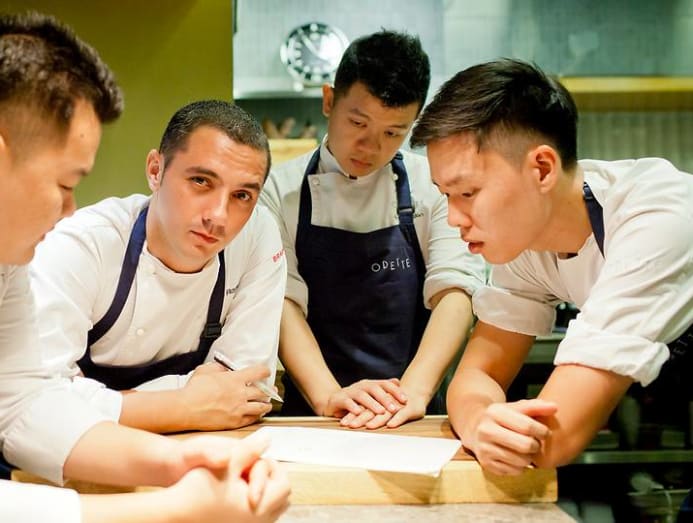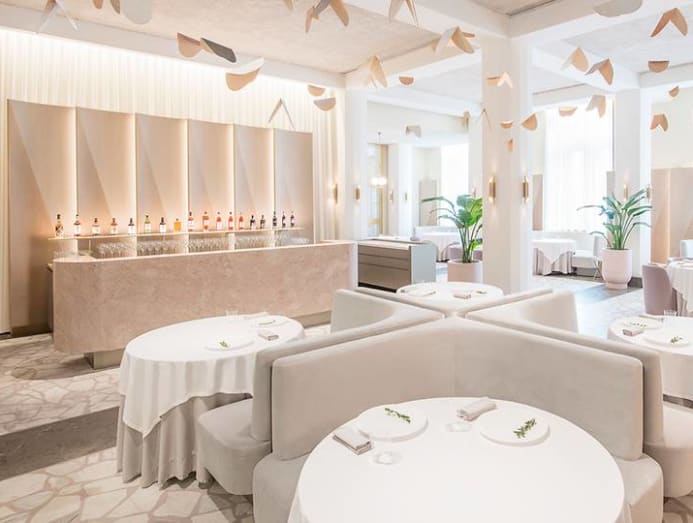What it takes to be Asia’s Best Restaurant: Inside the workings of Odette
The night Odette was named Asia's Best Restaurant 2019, chef Julien Royer and full general managing director Steven Stonemason did what about winners practise – they celebrated with more than a few drinks. "Only it was naught too wild," Royer was quick to point out. "Nosotros had to catch the ferry (out of Macau) early the next forenoon. We arrived in Singapore at 10pm and went back to the restaurant to drink champagne with the team."
As celebrated as the win is – Odette is the first restaurant from Singapore to earn the crown – an laurels in the restaurant business concern is just that: A rewarding affirmation from a punishing industry for the hard work and long hours that everyone puts in. By 9am the side by side solar day, information technology was business concern as usual.
It's a hustle the team knows well. Long before it was Asia's Best Restaurant, Odette has had the honor of beingness Singapore'south busiest fine dining establishment. Since it opened its doors almost four years ago, it hasn't gone a day without a warm seat in the firm.
"With rankings and awards, you must take that yous will win and yous volition lose. I know that all that is ephemeral," Royer said when asked about the attendant pressure that comes with the prestigious prize. "What matters is that we must be doing something right because the restaurant has been fully booked since twenty-four hour period one. That is the near priceless to us. That is what we constantly work for."
Inside THE KITCHEN
Royer may be Odette's main human being, just similar all good leaders, he is backed by a devoted team of about 25 full-time employees. A meal service hither is akin to a world-form dance performance that exudes effortless grace and rhythm, from the warm smiles that greet guests as they enter, right downward to the spotless gleam of a paper-thin water drinking glass that has been polished thrice.
Behind their balletic fluidity is the e'er-unfurling toil of physical labour, precision cooking and precious camaraderie. The team works in collective harmony, each member dependant on the other for the eating house'south success. They do this 16 hours a day, five days a week.

Royer describes his kitchen'south remainder as "frail" and leans upon his senior sous chefs Adam Wan and Levin Lau, and sous chef Sheng Xiong to ensure that the equilibrium never wavers.
"I brand all my decisions about hiring in the kitchen with them," said Royer. "If one of the states has doubts about the person, I don't hire him or her. This fragile balance is key to our success considering everyone hither must want to polish as a team, not every bit an individual. As soon as someone is unhappy, you tin tell." Even at this level of cooking, the adage that a happy cook produces ameliorate food remains sound.
The work they do is repetitive and exacting. The complex dishes change daily, depending largely on the produce and the team's imagination. Royer prefers to purchase ingredients in small quantities, which keeps the squad artistic and prevents waste material. 1 of the perks of being a eating place renowned for its succulent ingenuity is that every day, distributors from all over the world stream in with produce they promise the kitchen volition buy. Today, information technology was wild asparagus from Italia; yesterday, information technology was jars of love from the Philippines.
The team literally hits the ground running from the minute they arrive at their stations at 8.30am. For Royer, who typically arrives a little subsequently at 9am, the first order of business is greeting and chatting with every member of his restaurant. "It's very important to take a close relationship with everyone here," he reiterated.
"What matters is that we must be doing something right because the eating place has been fully booked since day one. That is the almost priceless to united states. That is what we constantly piece of work for." – Julien Royer
Dejeuner is the first priority and a complicated exercise since guests are given the option of a iv, six or eight-form menu with a choice of dishes for diverse courses. There's also a vegetarian menu and the fact that things don't always go to programme.
"A lot of what we cook depends on the timing of the deliveries," Royer added. "For case, today, I wanted to make a scallop with konbu and nage with mint, simply the scallops came late, and so we are using crabmeat instead. We besides wanted to exercise morels with asparagus and sweetbread, but at present the morels are coming tomorrow. Every day we have to deal with this balance, only I beloved it. I recall this is the manner to do it. When you don't order a lot of ingredients, yous don't end up wasting and there is no spoilage."
READ> How Singapore'southward restauranteurs are rising to the challenges of sustainability
On an easy afternoon, the concluding guests leave the dining room at three.30pm. Oftentimes, all the same, diners tend to stay far longer. The solar day before this interview, the last tiffin guest left at 5.30pm.
Front AND CENTRE
The bureaucracy in the dining room, called the forepart-of-house in industry parlance, mirrors that of the kitchen. At the pinnacle is general manager Steven Mason, who is aided by his team of about xiv assistant managers, head waiters, sommeliers, hostesses and waiters. The service they each purvey is built around providing a personalised experience and the power to read a invitee.
"We teach people that when they go to a tabular array, they must see what the table wants. If I get-go explaining the dish and they're not interested or focused, then I back off and get out them to their nutrient. If we see them examining the bottom of a plate or glass, nosotros tell them where the glass is from or who made the plate," explained Mason.
"If one of us has doubts about [a] person, I don't hire him or her. This frail balance is primal to our success because everyone hither must want to shine as a team, not every bit an individual." – Julien Royer
Much of the forepart-of-house work comprises general labour. From the minute the first shift begins at 10am, the squad mops floors, cleans tables and windows, prepares the cheese and drinks trolleys, polishes plates and glasses, and adjusts lights to ensure they are angled but so. Two hostesses tend to the over 200 emails that the restaurant receives every mean solar day.
After the last luncheon guest leaves, the team takes virtually hour and a half to gear up up for dinner before they take their only break of the mean solar day. During this 40-minute window, the entire staff shares a repast together. "3 times a week we cook and three times a calendar week, on big commitment days, nosotros purchase nutrient like chicken rice or noodles," said Royer.
"We spend and so much time together and that makes us family," added Mason. "We ever try to create unity with people. Like family, we may take a fight today, simply tomorrow we're dorsum at it.
"This is not an environment that's easy to work in – nosotros are always decorated and yous only get 30 to forty minutes to become something to eat and then go back to making sure people are happy and smiling and comfortable. So we value our people. This is what hospitality is almost, not just for the guest, but for our staff too."
THE Middle OF THE PEOPLE
Similar in any business, people form the cornerstone of Odette's success. Not only must its managers ensure that employees remain happy and motivated, there are also hundreds of customers whose myriad preferences must be considered. The profiles of 450 regular diners are recorded in nuanced particular, be information technology special diets, allergies, water, seating or whatsoever other idiosyncratic preferences.
"The hardest and most important thing is that everyone who comes to the restaurant has a different expectation, and we have to ensure we adhere to what they want," said Stonemason. "With Julien, yous're e'er working in a way that'southward changing and it can exist a challenge to proceed my squad smiling and positive. So I get in a bespeak to larn about them, have fun and laugh. We talk about how nosotros can make things better rather than me telling them how things tin can exist made better."
"We spend and so much time together and that makes u.s.a. family. Like family unit, nosotros may have a fight today, but tomorrow we're dorsum at information technology." – Steven Mason
It is obvious that Mason brings the pragmatism to Royer'south passion. "Julien always wants things immediately and I often have to tell him to tedious downward," Bricklayer said, giving Royer a jocular side eye. "Like we were just talking about how nosotros tin modify the bill and Julien is like, 'change it tonight!' But I accept to sympathize what'southward the best way to do it and what the process is going to be."
How does Royer recall it'southward going to get changed, I ask? "He doesn't know!" replied Stonemason, and they both break out in laughter.

It is articulate both men share a tight bond – they speak in the kind of shorthand that good friends share, shoot each other knowing looks throughout the chat, and even finish each other's sentences. They practice, after all, spend more time together than they do with their wives.
Their shared commitment to the restaurant'due south success shows in the accolades, the constantly decorated dining room, and loftier rate of staff retention. The average rank and file employee stays with Odette for between xviii months to two years, while some like senior sous chef Levin Lau accept worked with Royer for the last decade. This is impressive, as employee retentivity is something restaurants frequently grapple with, especially with the kind of hours that Odette demands.
Asia'southward All-time Restaurant or not, the pressure that comes with being at the elevation of the industry remains because they intrinsically originate from within. "We never allow it to become piece of cake for ourselves. The idea is e'er to go forward," said Bricklayer. "We are, first and foremost, a business. What's more important than any award is having a full, profitable restaurant night later night."
Royer nods in understanding. "I think we tin can always do better than the twenty-four hour period before."
READ> The Osaka chef who gave up French cuisine and Michelin stars to find himself
Source: https://cnalifestyle.channelnewsasia.com/experiences/inside-the-workings-of-asia-s-best-restaurant-odette-239666
0 Response to "What it takes to be Asia’s Best Restaurant: Inside the workings of Odette"
Post a Comment